10 minute read
Legal Sector Expert Corner: Sellors
“The geographical location of the Mid-Western region is great for us, in terms of connectivity with the United States,” Patrick says, “but the real benefit is the labour pool of highly qualified team members from universities such as UL and TUS, and multinationals such as Johnson and Johnson or Stryker.” Gillian Barry, Head of Innovation & Enterprise at TUS, understands all too well how important education, training and upskilling is to employers in the region. “We constantly engage with industry and listen to their needs, responding with a variety of solutions including apprenticeships, flexible postgrads and short advanced programmes such as microcredentials,” she says. “We’re seeing lots of innovation and new ways of learning in the educational sector to help solve companies’ problems. That’s something we can be really proud of in our region.” Gillian oversees the Limerick Chamber Regional Business Awards judging process, which is carried out under well-established codes of governance. The Chamber themselves are not involved in the judging – it’s outsourced to an independent panel of judges, to avoid any possibility of bias and ensure careful quality control. “The judges bring remarkable expertise and experience,” she says, pointing out that they tend to be drawn from the highest echelons in their industries. “They’re there from a business support perspective — they give their time for free to the Limerick Chamber to help the economic and social development in the community.” Judges of the 2021 awards included Lorna Conn, Deputy CEO of CPL Resources (Chairperson), Liam Woulfe, CEO of Grassland Agro, and Sean Lally, Manager and CoOwner of Hotel Woodstock. Having been involved in the Awards since their inception ten years ago, Gillian has seen them develop and iterate over time. “We work hard to ensure that the categories are genuinely meaningful – the criteria brings in a national and local strategic perspective as well as aspects of company development and innovation that are relevant to the current business context. All of this
fosters an exceptional level of trust, and means the Limerick Chamber award is a respected and muchcoveted accolade.” This is echoed by Elaina Fitzgerald, Director of Fitzgeralds Woodlands House Hotel & Spa, which won the Best Pandemic Pivot Award 2021. “To get that recognition from your peers, and the Limerick business community in particular, is a huge source of pride to us all,” Elaina recalls. “It’s an acknowledgment of our team, what they have achieved and how we overcame so many barriers during challenging times.” Organisations need to shape, adapt, and renew their underlying business model on a continuous basis to stay competitive. The Chamber recognised the team behind Fitzgeralds Woodlands House Hotel & Spa for their demonstrable breakthrough success in pivoting and reinventing their long-established family business. Through agile strategy, judicious use of assets and carefully-adapted capabilities, they were able to leverage a new opportunity that led to business sustainability during COVID-19 as well as growth and job creation in the hard-hit hospitality sector. No strangers to innovation, the Fitzgerald family have seen their four-bedroomed bed and breakfast blossom over four decades into a four-star hotel with 94 rooms and a 250-strong workforce. Now led by matriarch Mary Fitzgerald and her children, David, Elaina, Conor and Richard, and daughter-in-law Orla, the Adare-based resort encompasses a spa, leisure centre, as well as 40 acres of lush woodlands and organic gardens. It was this outside space that lent the inspiration for their remarkable pivot during the

pandemic. “While we were confined to a fivekilometre limit, we were conscious that we had a great space for people to safely take in some fresh air, clear their heads and enjoy the great outdoors,” Elaina recalls, “Then we thought offering a simple coffee and pastry would be an opportunity to bring back some of our team.” Over the next two years, that ‘coffee and pastry’ combination would morph into The Treehouse, an all-weather family-friendly experience that offers Scoops ice-cream, Farmhand coffee, New York-style pizza and private
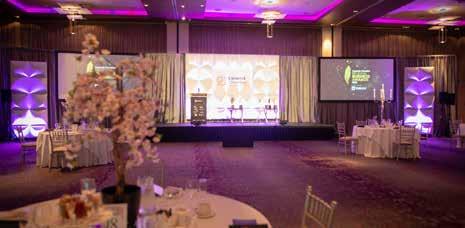
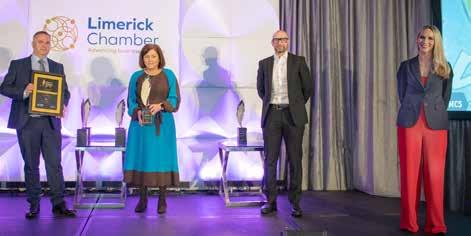
dining at the cosy and comfortable Tree Huts. “It didn’t start as a commercial opportunity at all, but we couldn’t have anticipated the take-up,” Elaina says. “Within two weeks we had twenty people employed by the Tree House; it gave them and our guests a place to go, a sense of purpose, and a way to stay connected to their community – safely.” As then-president of the Irish Hotels Federation, Elaina was acutely aware of the challenges the hospitality industry was facing at that time, and worked to make sure that her team was supported. The family ran ‘Wellness Wednesday’ Zoom calls that checked in on staff members, providing resources in terms of social connection, employment advice, and in particular, further education opportunities. “We encouraged our teams to get into the zone of upskilling,” she says, “That meant engaging in infectious disease and protection training, offering bespoke educational programmes, and helping staff work cross-functionally, making the best use of whatever individual skills or talents they have.” In a stroke of bad luck, Elaina and her siblings tested positive for COVID-19 while the Limerick Chamber Regional Business Awards were taking place in November. Fortunately, their mother Mary was in fine health, and she was able to collect the prestigious award in person. “On a personal level, it was just the lift we needed while we were all under the weather,” Elaina remembers. “The prizes or accolades that matter the most to you are the ones that tie in with your own values: this award was local, chosen by the business community, and in recognition of the hard work, dedication and pure passion of our team. It was a very special moment.” Other award-winners have experienced significant growth since taking home Limerick Chamber titles. Musical app Huggnote – founded by Limerick sisters Jacqui and Perry Meskell – won Best Emerging Business in 2021 while also acquiring 300,000 users in 205 countries and a $50,000 pitching prize on a US TV show called Two Minute Drill. A Limerick stalwart for many years, Analog won Best Employer and Best Overall company in 2019 and has since developed ground-breaking diversity, empowerment and sustainability initiatives within their workforce. “There’s nothing better than the Chamber Awards ceremony,” Gillian Barry says. ”It’s a place for contemporaries to meet, network with new people, and do plenty of business – while having the craic as well. It’s a really lovely celebration of achievement, and an important occasion for reconnection.” Limerick Chamber CEO Dee Ryan recalls that the 2021 Awards were extra-special for a number of reasons. “There is always a lot of industry interest and media attention around our awards, which represent a key event on the region’s business calendar. It’s fair to say, though, that the 2021 ceremony had a deeper meaning, coming during a traumatic time for people in business, a period of immense and sudden change. That so many have adapted so well is testament to the people in those businesses and, indeed, the solidarity shown across the region. It was a great opportunity to celebrate the exceptional resilience of the nominees and winners – all of whom didn’t just survive the pandemic, but found innovative and inspirational ways to thrive.” The Limerick Chamber is proud to have played a pivotal role in supporting the Limerick City and County business community, through difficult challenges and exciting opportunities. From facilitating valuable training to hosting annual awards, the Chamber continues to work to represent all of its members, serving to make our stakeholders’ voices heard at a local and national level and building towards a bright and prosperous future for the midwest region.
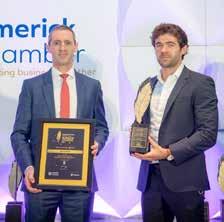

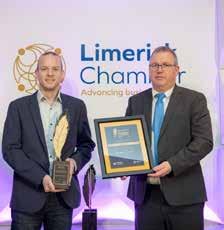
From Pandemic to Endemic: What are the obligations on Employers now?
The phased return to physical attendance in the workplace is well underway. While the Government/ statutory bodies provide general guidance, employers must review their policies and work out specific measures, in consultation with employees, to ensure the safe operation of their workplace in line with prevailing governmental advice. Employers should have a tailored business COVID-19 Response Plan, an occupational health and safety risk assessment and a safety statement, which stipulates, how to deal with a suspected case/outbreak of COVID-19 and the dedicated personnel.
Employers should continue to implement good practices which support a safe working environment, e.g. good infection prevention and control measures such as hand/respiratory hygiene, regular cleaning/ ventilation, displaying information in relation to same, providing, as reasonably practicable, hygiene products, PPE etc. Also, while maintaining a two-metre physical distance and mask wearing in certain settings are no longer mandatory, such requirements continue to be good practice, particularly in shared/crowded areas or with high/very high risk employees.

For many employers, the last two years have been a forced experiment in terms of the suitability of their operations for remote working. At present, unless stipulated in an employment contract, employees do not have an automatic right to work remotely. The Government has asked employers to develop longerterm arrangements for blended/remote working having regard to their operational requirements. The draft Right to Request Remote Work Bill 2021 has been published but has not yet become law. It provides that employers must have a written Remote Working Policy, dealing with management of remote working requests and the conditions applicable. If a request is refused, the employee must wait 12 months to submit another request, unless the employee moves to a new role internally. The employer must stipulate a response time of no more than 12 weeks. There is a minimum service requirement of six months before submitting a request. Employers may refuse a request for remote working if there are reasonable grounds, which include but are not limited to; the nature of the work may be unsuitable, cannot reorganise work among existing staff, potential negative impact on quality and/or performance, planned structural changes, burden of additional costs, concerns re: the protection of business confidentiality/intellectual property/ suitability of the proposed workspace on health and safety grounds/data protection grounds/internet connectivity, inordinate geographical distance, conflict with collective agreement, ongoing/recent formal disciplinary processes. Employees may appeal to the Workplace Relations Commission for employer failure to respond to a request/provide reasonable grounds for refusal or penalisation for making a request.
When agreeing an arrangement with an employee for remote working or a blended/hybrid work arrangement, employers, as a first step, employers should review existing policies, safety statement and employment contracts. To minimising potential liability, employers need robust policies that are communicated clearly to employees. Employers must be able to manage employees and their performance/conduct while working remotely, including provisions for review of the arrangement. Clear communication is required in terms of the parameters of the arrangement, duration, employee obligations, hours of work, requirements of the home office. Employers must be able to meet their legal obligations. Employers have a duty to ensure the safety, health and welfare at work of all employees including those working remotely. Employers need to consult with employees to ensure the employee is aware of any specific risks regarding working remotely, to implement a prearranged means of contact and to assess suitability of the work, workspace and equipment provided. Other obligations include keeping records of hours worked, leave, rest periods, breaks, without intruding on employee privacy. Employers will also need to consider confidentiality, GDPR obligations and necessary safeguards, cybersecurity, employer liability insurance.
If you have any questions or require any assistance with developing a policy or communication to your employees on remote/hybrid arrangements, please contact, Dervla Beirne, Solicitor, Sellors LLP.









